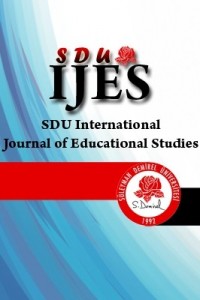Abstract
The significance of
Intercultural Communicative Competence (ICC) in foreign language teaching has
been recognized with the globalization and the role of English language as a
Lingua Franca (ELF) has been well-established over the last decades. Therefore,
the integration of culture into the process of foreign/second language teaching
is gaining more and more importance. Several studies that investigate the
importance of ICC have been conducted; however, it is a matter of fact that the
actual integration of ICC into language classes is quite limited. This study
aims to find out the differences between two English Language Teaching student
groups; namely, the ones who have participated in Erasmus+ Programme during their
undergraduate education and the ones who have not, in terms of their
intercultural attitude, knowledge, skill and action. The questionnaire from
Ergün (2016) has been utilised to assess the participants’ attitudes towards
ICC. The data has been analysed through SPSS version 22 and t-test has
been used to analyse the means of the two groups separately. The results
of the study have revealed that there exists a statistically significant
difference between the two groups of participants. The findings indicate that
the group of Erasmus Students showed more positive attitudes towards ICC than
the non-Erasmus Students group.
References
- Ahnagari, S. & Zamanian J. (2014). Intercultural communicative competence in foreign language classroom. International Journal of Academic Research in Business and Social Sciences, Vol. 4, No.11.
Abstract
References
- Ahnagari, S. & Zamanian J. (2014). Intercultural communicative competence in foreign language classroom. International Journal of Academic Research in Business and Social Sciences, Vol. 4, No.11.
Details
| Primary Language | English |
|---|---|
| Journal Section | Articles |
| Authors | |
| Publication Date | April 30, 2019 |
| Acceptance Date | March 28, 2019 |
| Published in Issue | Year 2019 Volume: 6 Issue: 1 |

